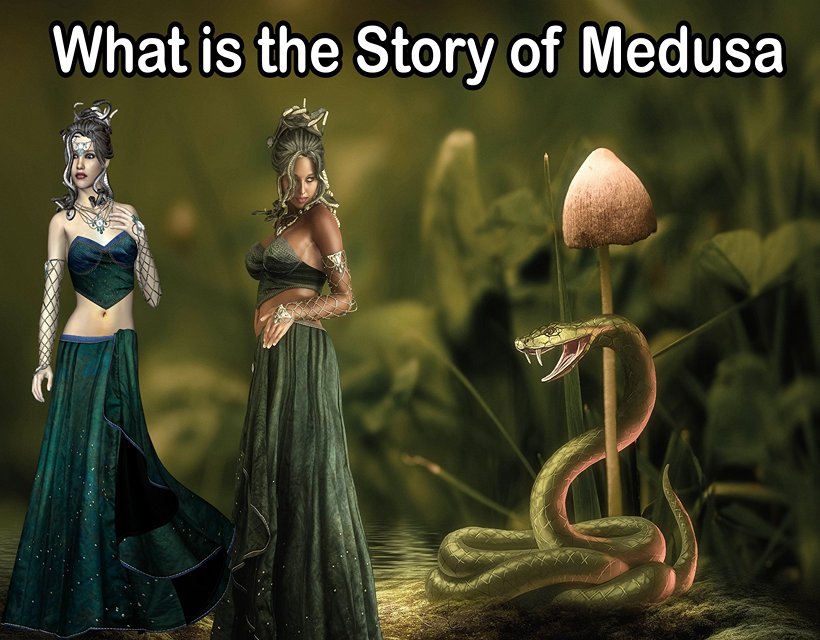What is the Story of Medusa
The story of Medusa is one of the most enduring and fascinating myths from ancient Greek mythology. The story of Medusa has been retold countless times over the centuries and remains an enduring symbol of feminine power and beauty, as well as a cautionary tale of the dangers of hubris and jealousy. What is the Story of Medusa – Medusa Story Summary
According to Greek mythology, Medusa was originally a beautiful young woman, with long flowing hair and a stunning face. However, she made the mistake of boasting about her beauty and attracting the attention of the sea god, Poseidon. Poseidon was smitten with Medusa and desired her, but Medusa rejected him, as she was a priestess in Athena’s temple and had taken a vow of celibacy. In his anger and frustration, Poseidon cursed Medusa and transformed her into a hideous monster, with snakes for hair and a gaze that could turn anyone who looked at her into stone. What is the Story of Medusa – Medusa Story Summary
After her transformation, Medusa was shunned by society and forced to live in isolation, as anyone who saw her would be turned to stone. However, her fate was sealed when Perseus, the son of Zeus, was tasked with killing her as part of his quest to save his mother from the clutches of the evil king, Polydectes.
Armed with a reflective shield from Athena and a sword from Hermes, Perseus managed to approach Medusa without looking directly at her. He used the reflection in the shield to guide his strikes and managed to decapitate the monster, killing her instantly. From her severed head sprang the winged horse Pegasus and the giant Chrysaor.
The story of Medusa has been retold in various forms over the centuries, with some interpretations focusing on her tragic fate as a victim of male aggression and jealousy, while others portray her as a symbol of feminine power and rebellion. In some versions of the myth, Medusa is portrayed as a strong and powerful warrior, with her snakes for hair acting as a fearsome weapon. In others, she is a more sympathetic character, cursed by the gods for a minor transgression and forced to suffer for their amusement.
In popular culture, Medusa has been depicted in various forms, from the monstrous gorgon of Greek mythology to the seductive and alluring temptress of modern literature and film. Her image has become an enduring symbol of female power and beauty, as well as a warning about the dangers of vanity and pride. What is the Story of Medusa – Medusa Story Summary
The story of Medusa remains a timeless tale of tragedy and transformation, exploring themes of beauty, power, and the consequences of hubris. Her story has inspired countless works of art, literature, and film, and continues to captivate and fascinate audiences around the world.
One such variation tells the story of Medusa’s sisters, Euryale and Stheno. Unlike Medusa, who was mortal, her sisters were immortal and feared by all who knew of them. Some versions of the myth suggest that the three sisters were born with their monstrous appearances, while others claim that they were cursed by the gods.
Another variation of the myth explores the idea that Medusa’s curse was not solely caused by her rejection of Poseidon’s advances, but rather by her association with Athena. In some versions, it is said that Athena cursed Medusa as punishment for desecrating her temple, either by breaking her vow of celibacy or by having sex with Poseidon on the temple grounds.
The story of Medusa has also been interpreted as a metaphor for the male fear of female sexuality and power. Medusa’s serpent-like hair is often seen as a symbol of her sexual power and her ability to entice and seduce men, while her gaze is a representation of the power of the female gaze to emasculate and destroy male dominance.
In literature and art, Medusa has been depicted in a variety of ways, from the grotesque and monstrous to the sensual and seductive. The Italian artist Caravaggio, for example, painted a dramatic and haunting image of Medusa’s severed head, while the French sculptor Auguste Rodin created a sensual and alluring representation of the mythological figure.
The story of Medusa has also been explored in modern popular culture, with various films, books, and television shows featuring interpretations of the character. In the Percy Jackson and the Olympians series of young adult novels, for example, Medusa is portrayed as a villainous character who seeks revenge against the gods.
The story of Medusa remains a compelling and complex myth that continues to inspire and fascinate people around the world. It speaks to our deepest fears and desires, exploring themes of power, sexuality, and the struggle for acceptance and redemption.
Perseus is often seen as the hero of the Medusa myth, as he is the one who ultimately slays her and frees her victims from their petrified state. However, there are some interpretations of the myth that view Perseus as a more complicated figure.
In some versions of the myth, Perseus is portrayed as a young and inexperienced hero who is tasked with a seemingly impossible mission. He is aided by various gods, including Athena and Hermes, who provide him with the tools he needs to defeat Medusa. However, despite his success in killing Medusa, Perseus is also shown to be somewhat callous and cruel in his treatment of her body. What is the Story of Medusa – Medusa Story Summary
In some versions of the myth, Perseus uses Medusa’s severed head as a weapon against his enemies and even shows it off as a trophy to the people he encounters. This treatment of Medusa’s remains is seen by some as a symbol of the way in which powerful men often exploit and demean women’s bodies for their own purposes.
Another aspect of the Medusa myth that is worth exploring is the way in which it has been used as a symbol of feminist empowerment. In recent years, Medusa has become a popular icon for feminist movements, as her story is seen as a powerful allegory for the ways in which women have been oppressed and silenced throughout history.
In this interpretation, Medusa’s snakes are seen as a symbol of female rage and power, while her petrifying gaze represents the way in which women’s voices and experiences are often dismissed or ignored. By reclaiming Medusa as a symbol of female power and resistance, feminists have sought to challenge traditional notions of femininity and advocate for gender equality.
The story of Medusa is a rich and multifaceted myth that has inspired countless interpretations and reimaginings over the centuries. Whether viewed as a cautionary tale of the dangers of pride and hubris or as a symbol of feminist empowerment and rebellion, Medusa remains a powerful and enduring figure in our collective imagination.
One such aspect is the way in which Medusa’s story reflects ancient Greek beliefs about the power of the gaze. In Greek culture, the gaze was seen as a powerful tool of communication and influence, capable of inspiring awe, fear, or desire in those who encountered it.
Medusa’s petrifying gaze is a powerful embodiment of this belief, as it is said to have the power to turn anyone who looks upon her into stone. This aspect of the myth has been interpreted in a variety of ways, with some seeing it as a metaphor for the way in which beauty and desire can be both alluring and dangerous, while others view it as a symbol of the way in which the powerful can use their gaze to control and dominate others.
Another interesting aspect of the Medusa myth is the way in which it has been used to explore themes of transformation and metamorphosis. In some versions of the myth, Medusa’s transformation into a monster is seen as a punishment for her pride and hubris, while in others it is viewed as a manifestation of her inner darkness and rage.
The story of Medusa’s transformation also highlights the theme of duality, as Medusa is shown to have both monstrous and human qualities. This duality has been interpreted in a variety of ways, with some seeing it as a reflection of the complex and contradictory nature of human identity, while others view it as a symbol of the struggle between our animalistic and civilized selves.
The story of Medusa has been used to explore the theme of redemption and forgiveness. In some versions of the myth, Medusa is shown to be a sympathetic figure who is cursed unjustly and seeks redemption for her crimes. This aspect of the myth has been interpreted as a reflection of the ancient Greek belief in the power of repentance and forgiveness and has resonated with audiences throughout history.
The Medusa myth is a rich and complex story that continues to inspire and challenge us today. Its themes of power, transformation, duality, and redemption speak to some of the most fundamental questions of human existence, and its enduring popularity is a testament to the power of myth to shape our understanding of ourselves and the world around us. What is the Story of Medusa – Medusa Story Summary













